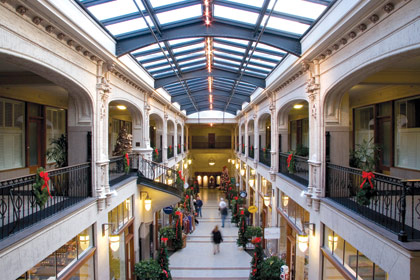The Grove Arcade, one of downtown Asheville's most distinctive landmarks, can't make the payments on its debt to the city. After acquiring the historic structure from the federal government in 1997, Asheville signed a 198-year lease with the Grove Arcade Public Market Foundation, which manages the property.

The rents from the arcade's retail and office spaces, restaurants and apartments — currently about 90 percent occupied— total about $1 million annually.
Nonetheless, the foundation has struggled to pay its debts to both the city and Progress Energy (which also loaned the nonprofit money) in recent years. And at a May 18 meeting of City Council's Planning and Economic Development Committee, both arcade representatives and city staff made it clear that the situation won't be changing anytime soon.
"There's just not an ability to pay the debt as it's structured today," Economic Development Director Sam Powers told the committee.
The arcade reopened in 2001 following extensive renovations partly funded by a $2.6 million loan from the city. But the 80-year-old building's high maintenance costs (more than $900,000 annually, due in part to the massive structure's historic status and large open space) consume most of the revenue, leaving little to cover debt payments or other needs, such as a new roof. City Council granted the nonprofit a deferment in 2007, and it was able to make its 2008 payment in 2008.
But the group once again failed to make a payment last year and, according to foundation Treasurer Scott Hughes, 2010 won't be any different.
"This asset belongs to the city, and we have to choose whether the money goes for maintenance or goes to debt," he explained. "We don't make a profit. Whatever we make is going into the building or being used to reduce that debt."
City staff suggested crediting the nonprofit with the roughly $60,000 the arcade generates in property- and sales-tax revenues each year, thus reducing its annual debt payments to about $116,000.
"An argument can be made that without upfitting and opening that building, we wouldn't be making that revenue at all," noted Powers, but he added that even with such a credit, the debt "is going to be a challenge for them to meet."
Former Asheville Mayor Russ Martin, who serves on the foundation's board, said City Council needs to help, reminding committee members that the city bought the building for $1.
"This is the best deal the city's ever gotten," Martin declared. "We've generated a lot of sales-tax revenue, we've generated a lot of jobs, and one of the most important things we did was revitalize the western part of downtown. It's one of the hottest areas in real estate right now: People want to move into the Grove Arcade. It's not, I think, too much to ask to take a good, hard look at what's being generated. It might need more, even, than what's being proposed here to continue."
Council member Gordon Smith said the city would probably end up taking some sort of action but that he wanted to be aware of "other options" first.
Council member Jan Davis, who chairs the committee, said those options are pretty limited.
"We have a responsibility to the foundation: This fine group of citizens could just walk over here, hand us the keys and say, 'We're gone,'" he noted. "We don't really have a lot of choice here. I would think that Council would do well to consider the sales-tax generation and taking a greater role in fixing the building one day."
The committee made no recommendation, referring the matter to City Council for consideration.
David Forbes can be reached at dforbes@mountainx.com or at 251-1333, ext. 137.



First, is $900,000 a normal amount of money to be spent on maintenance for a building of that size and age? Where is this $900,000 actually being spent? Is it all maintenance money, or does it also include some high salaries for Grove Arcade Foundation executives? And, where is the information on how much money is being made/or has been made off of condo sales. Where has that money gone?
Second, the city bought the building for $1. If that location is such a hot spot of activity, I’m making a guess that there’s a willing buyer out there who will gladly take it off the city’s hands for quite a bit more than $1.
There are just too many unanswered questions that the Grove Arcade Foundation Board and the City are not providing.
Off topic here but . . is MountainX going to give us some coverage/analysis of the concerns Grovemont residents have about the new VA facility in their neighborhood?
Asheville needs to get out of the business of taxing hotels, which are sometimes human needs, to subsidize tourist boutiques which never are. The city should forclose on the Grove Arcade, with it’s overpaid managers, and auction the building off to the highest bidder without use restrictions.
Isn’t this the second time this building has gone under? How does this building benefit the city if it is running such large deficits?
According to the 2009 Grove Arcade Public Market Foundation, Inc. tax return, the Foundation had $5,705,266 in unrestricted net assets, and $3,957,746 in liabilities. Why can’t it pay its debt? Can MountainX investigate/publish the relevant documents about how this entity operates? Why don’t reporters ask more questions?